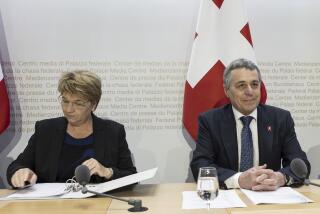Arab League summit is held despite snubs
- Share via
DAMASCUS, SYRIA — A U.S.-backed effort to isolate Syria by prodding Middle East leaders to boycott this year’s Arab League summit prompted a lot of no-shows Saturday but will ultimately fail to weaken Damascus’ alliances with Iran and militant groups, officials and analysts here said.
Only 12 of the 22 Arab League members sent heads of state to the conference, with Saudi Arabia and Egypt represented by minor officials and Lebanon sending no one.
The boycott, which reflected a deep rift between Saudi Arabia and Syria, was meant to show Syrian President Bashar Assad the consequences of his ways. But Syria may draw a different lesson from the snubs: Despite U.S. pressure, it can continue to build its alliance with Iran and support Hamas in the Palestinian territories and Hezbollah in Lebanon while maintaining strong ties with enough regional countries to ensure its security and economy.
“Syria will never be isolated,” Yussef Ahmad, Syria’s envoy to the Arab League, said in an interview on the sidelines of the summit. “He who doesn’t attend the summit is isolating himself.”
Syria and Saudi Arabia are sharply at odds over Lebanon, where Riyadh supports the Sunni-led government and Damascus backs the opposition, led by the Shiite militia Hezbollah. Syria is viewed as part of an Iranian-led coalition of states and organizations opposing the efforts of the Bush administration, which is close to the Saudis.
Two other U.S. allies, Egypt and Jordan, which support Palestinian Authority President Mahmoud Abbas’ Fatah movement, also find themselves opposing Syria, which backs Fatah’s rival, Hamas.
The Arab League summits, held in a different member country each year, have rarely accomplished much. Diplomats and heads of state around the region gather to discuss and issue diktats on matters such as the plight of the Palestinians, the continuing political deadlock in Lebanon and the violence in Iraq, where battles in Basra and elsewhere caused Prime Minister Nouri Maliki to send Vice President Adel Abdul Mehdi to Damascus in his place.
Pageants of pomp and decorum, the gatherings mostly amount to symbolic affirmations of Arab unity. The Syrian intelligentsia took in stride the Saudi-led snubs and other maneuvers to delay or move the summit.
“The Syrians have been able to hold the summit regardless of all talk about postponing it for two months,” said Sami Moubayed, a Syrian analyst. “They’ve held it despite all talk of having a preemptive summit in Sharm el Sheik,” in Egypt. “They have maintained their ties with Iran, Hamas and with Hezbollah. And they’ve gotten away with it.”
In his opening remarks Saturday, Assad struck a conciliatory tone, promising that Syria would do all it could to resolve the crisis in Lebanon and urging Arabs to focus on Israel, which he harshly condemned.
“What is beyond doubt is that we are all in the same boat, facing turbulent currents, and there is no doubt that we have no alternative to consulting, coordinating and working with each other to unify our stands, regain our rights and achieve growth and development for our countries,” he said.
But privately, Syrian officials lashed out at the Saudis, saying they complain of Damascus’ relations with Iran while maintaining strong ties to the Islamic Republic themselves. It was the Saudis, one noted, who invited Iranian President Mahmoud Ahmadinejad to the Gulf Cooperation Council conference last year.
“At least we didn’t invite a Persian to an Arab summit,” said one Syrian official, who spoke on condition of anonymity.
Iranian Foreign Minister Manouchehr Mottaki attended the Damascus summit as an observer.
Analysts say diplomatic jabs may offer little incentive for Syria to change its ways. Investments from the oil-rich Persian Gulf states seeking undervalued properties continue to pour into Syria, which is undergoing a development boom. The emirs of the United Arab Emirates, Qatar and Kuwait, all close to the Saudis, attended the conference, as did the leaders of the oil-rich Arab states of North Africa such as Libya and Algeria.
Syria has also found other regional players and rising powers to turn to in the wake of the Saudi split. In addition to a strategic military alliance with Iran, Damascus’ relations with Turkey have warmed dramatically in the decade since Syria aided in the capture of Kurdish rebel leader Abdullah Ocalan. Trade between Turkey and Syria totaled $1.1 billion last year.
“Egypt is in decline and Saudi Arabia has not taken up the leadership role it could take,” a Western diplomat in Damascus said, speaking on condition of anonymity. “The Syrians are counting more on other actors, especially Iranians, but also Turkey, which has the motive of regional stability.”
--
More to Read
Sign up for Essential California
The most important California stories and recommendations in your inbox every morning.
You may occasionally receive promotional content from the Los Angeles Times.










